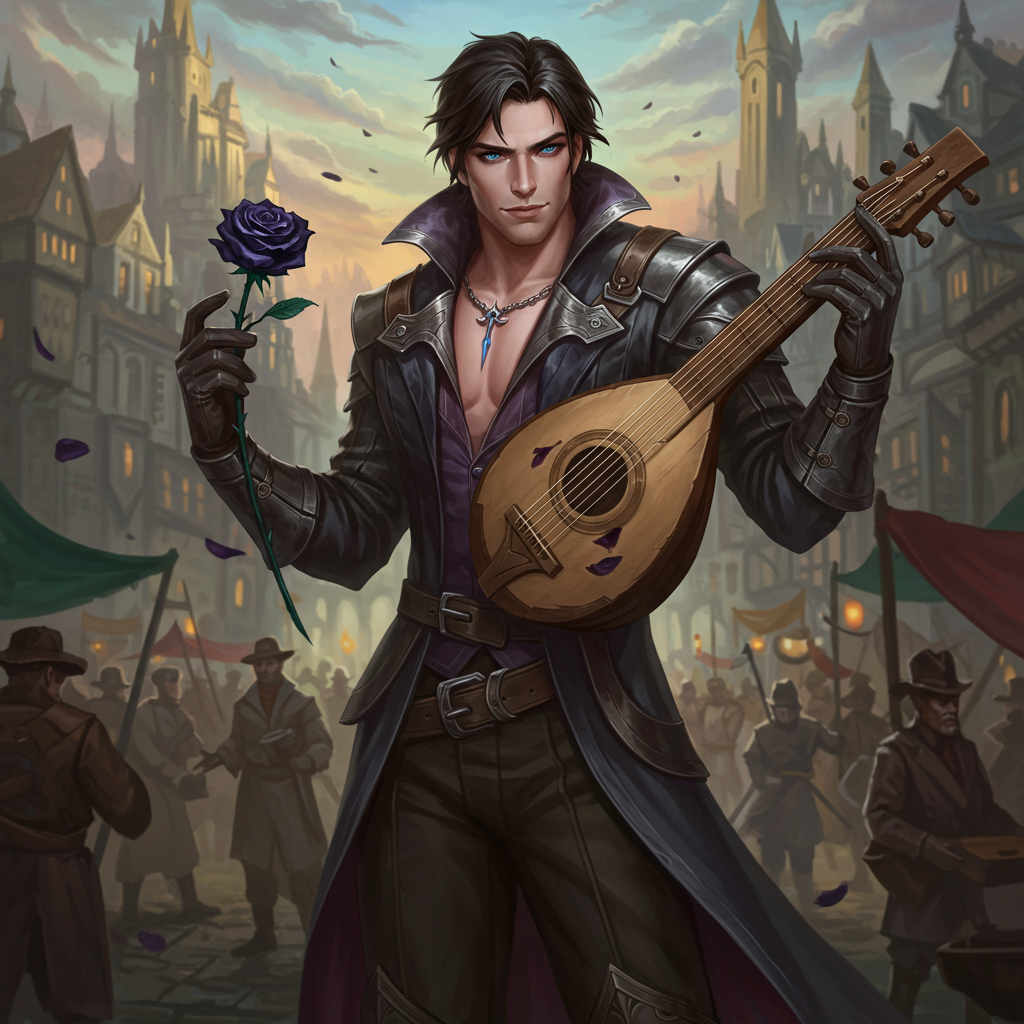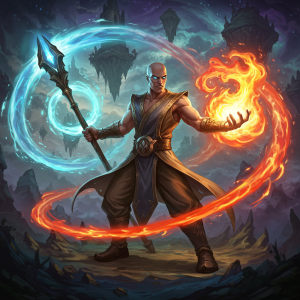The Bards of Aetolia
Bards are performer-assassins, trained in the ancient traditions of Djeir's Theater of Shadows. They are a diverse and multi-dimensional profession, seamlessly blending physical dexterity and wit with both the mysterious art of light weaving and the ability to elicit powerful magical effects from their songs. Though Djeirani in origin and steeped in the Undercity's culture, training in the Bardic arts became available to Sapience in the Year 502, following the profession's near-destruction by the hands of Nalibhtavi, the Replete, a year prior.


Bard Skills
The art of Weaving is a crude but powerful technique, allowing the Bard to create and shape light, often into physical form. Whether it is used to conjure items on demand to debilitate a target, or create facsimiles of objects to use as props, it is a versatile skill well-suited to both theatrics and assassination.
Its ancient roots have a long, storied history in Djeirani culture, having existed since the first days of the underground race itself. Legend states that the Djeirani people were once spiders of Azdun - remnants of the Dark Empire - before being changed by the Lady Chakrasul, and the first hints of Weaving came from that ancestral form. As the spiders spun their large webs within the vast underground, they would imbue light along their strands, creating a luminous trap to enthrall and ensnare their prey. Though the Djeirani lost the ability to produce and spin silk in their modern forms, the art of drawing upon this light remained.
Today, there exist many forms of Weaving within the Undercity. Some are used to create the orbs of light that illuminate the vast cavern, while others might be familiar to adventurers in mention of Zaili and the net of revelation. The Bards have adapted the art of Weaving to their own needs, creating something distinct from these other forms. Some scholars have drawn links between Weaving and the skill of Enchantment, suspecting the two to have related histories, though this theory has yet to be proven.
Weaving can be identified by the trailing light following the caster's free hand during the spellcasting process, as they draw upon the ambient spirit around them. This is then spun into illusory objects, strands of illuminated thread taking simple forms that can be controlled freely by the Bard.
Experts in the craft are capable of creating far more complex objects, such as blades or collars. However, this masterwork is extremely taxing, requiring significantly more sources of conjured light to enact while causing the caster severe magical fatigue. The most elaborate Weaving spectacles often require multiple stages to complete, necessitating bigger sources to be created in preparation for a final, grand conjuration.
This magical fatigue or "dithering" can be mitigated through the use of onyx. Weavers commonly choose to wear bracelets and jewellery with gems of that black stone in order to gird themselves against exhaustion and carry out their works for more prolonged periods. In mythology, the Black Rose of Djeir is a powerful artifact of onyx, gifted to the city by Chakrasul at its founding. Said to be only useable by the bloodline of the Empress, the Black Rose allows her to spin powerful feats in order to protect her underground empire.
Ready to play a Bard?
Create your character and play for free today - no download required!
History of the Bards
Performers and assassins both, the Bards of Djeir operate openly out of their historical sanctuary, the Theater of Shadows. Their origins lay within the founding years of Undercity of Djeir, arising as a theater that showcased a gruesome - yet celebrated - blend of traditional drama and bloodsport. As the Undercity became embroiled within the throes of civil war following the death of Jy'rilia Garilicci, First Empress of Djeir, the Bards emerged as an unexpected power.
As all the major and minor noble houses warred for the throne, opportunities for public theater spread thin as the safety of a manor's walls grew more attractive. Still craving entertainment, the nobles began instead to invite the Theater to their estates to host their dramas for them and their allies. This provided many opportunities for a Bard to glean the secrets and plans of each house in order to sell the information to enemy factions. It did not take long for the first hired kills to follow that, starting the Bards' long, storied tradition in aristocratic assassination.
The Theater of Shadows grew powerful with alarming haste, eventually turning the nobility against them. As most houses established a tenuous ceasefire in order to slaughter the Theater, a fabled hero-bard would pen his name into the history books using a blood-stained falchion: Vascsce, of common birth. A talented actor and lead performer in the Theater, Vascsce was already owed fame, yet the events the eve before the Bards' planned demise would elevate him to legendary status.
Vascsce was lover to one Nueciale Garilicci, a minor noble within her family line with little prospects, that had accidentally become privy to her elders' scheme. Learning of the plans through her, Vascsce sought to bring an end to the civil war and secure a future for him and his colleagues. Humming a tune, he set off to the noble quarters and demonstrated his other talent.
One by one, Vascsce felled the heads of each house in a deadly performance, the intensity of his humming growing as he continued manor to manor, deeper into the noble quarters of the city. Resistance mounted to levels impossible for him to overcome and Vascsce bared all he had as the tune reached a fevered pitch. Prepared for death, he was stunned instead to see a path cleared before him as guard turned upon guard in defiance of reason. He had poured every inch of his being into his work during the frenzied encounter - including his soul - heightening his tune to magical levels to discover the art of Songcalling.
By the time the morrow had arrived, any noble that had a stronger claim to the throne than Nueciale was dead. She was coronated as Empress, ending the brutal civil war and solidifying the Garilicci family's position as the royal line. One of her first decrees was to grant Vascsce "attro ca pa'sa" - the Grace of the Empress - forgiving him of any crimes committed under Djeirani law. Her next ruling act was to establish a relationship with the Theater of Shadows, enacting an accord that lasts even today.
In short, the accord established that the sitting Empress of Djeir would be patron to the Theater of Shadows, and in exchange, the Empress would be immune to any assassination or attack from them. Should a Bard carry out an assassination, they must perform certain ceremonial steps during the deed in order to be able to invoke attro ca pa'sa and be forgiven of any crime. Failure to complete the proper ceremony would find them instead subject to Djeirani justice.
And so it remains a rare affair for a Bard to carry out a cloak and dagger assassination. Those still happen, when the need is high and pay is higher still, but it carries great risk to the Bard. Without a public audience to witness their kill, they would be beholden to honesty of the victim's family that the ceremony was completed properly. The theater of bloodsport was reborn under the royal accord and the Bards leaned into their performance. With each hired kill, a Bard tried to out-do prior spectacles to gain fame and notoriety, and to stretch towards the legend of Vascsce. And with each kill, the Djeirani cheered and reveled.
Defined by their three skills of Performance, Weaving and Songcalling, the Bards use each one for both theater and killing. With Performance, the Bards utilise their falchion with flair while finding ways to throw off an opponent's pace. Through Songcalling, a Bard can sing forth songs of legend to affect their audience in a powerful manner that can be beneficial or harmful. And finally, the traditional Djeirani art of Weaving is used to conjure items of light to pin a target down.
Bards first came to the spotlight of wider Sapience during the events of the Grand Tragedie in the month of Lleian, 501 MA. Ostensibly, the play was put on as an offering to Nalibhtavi, the Replete in an attempt to entertain and please the hedonist Goddess. In reality, the drama was the front for a spectacle assassination, masterminded by the Bard Teclah Neri against the two Ash'aji noblemen invited to act the lead roles. Hoping to create her best performance, she instead horribly miscalculated the reaction of the Elder Goddess. Rather than being pleased at the bloodshed, She grew outraged at the desecration of theater. In Her final acts of existence, the Full One slaughtered almost every single of the Djeirani Bards.
Following the decimation of the Bards, Haratos, Master of the Theater, opened the doors of the Theater to any outsiders willing to learn their traditions. Adventurers looking to apprentice as a Bard should seek out Haratos within the Theater of Shadows in Djeir. For a fee of 40 credits, he will share his knowledge (LEARN BARD FROM HARATOS at v73205).
Adventurers may practice these skills within their guilds, however newbie Bards that join through the introduction can not join a guild until they have met the multiclassing prerequisites of being Virtuoso in Performance, Songcalling, and Weaving, or Transcendent in two of them.
Roleplaying a Bard
Found in all corners of the land, Bards are a group as diverse as the instruments they play. While it may be tempting to discount these performers as simply that, to do so could ultimately wind up being a lethal mistake.
What is the Theater of Shadows?
Located deep within Djeir, the Theater is the historical sanctuary of the Bards, known for its entertaining blend of both traditional drama and blood sport. When the Undercity found itself embroiled in civil war, the Theater emerged as an unexpected political power, expanding their skills from mere entertainment and theatrics into the art of aristocratic assassination. So vast was the influence of the Theater in those days that it achieved what few had ever done before: uniting the noble houses of the Undercity against it.
It was a man known as Vascsce, a low-born commoner, who would ensure the Theater's continued existence into the modern era, slaughtering the heads of each house save for that of his beloved, Nueciale Garilicci. In so doing, Vascsce not only preserved the ways of the Bards and averted their eradication, but cleared the way for Nueciale to claim the Djeirani throne as Empress, ending the civil war and earning the right of attro ca pa'sa in a concordat that lasts until this very day.
What is the Concordat?
The Concordcat is a contract between the Theater of Shadows and the throne of Djeir. Its terms establish the Empress of Djeir as the Theater's Patron and affords the Bards the right of attro ca pa'sa - the Grace of the Empress. It is this royal assent that guarantees the Bards freedom from prosecution or punishment for their assassinations, effectively legalising the act provided certain conditions are met.
In exchange for this freedom, the Theater of Shadows agrees not to take contracts or writs on the throne of Djeir, providing immunity from the organisation's assassins.
Invoking attro ca pa'sa requires that the Ceremony of the Rose - known more commonly as Da'ath Nievva - be carried out prior to any assassination attempt. This elaborate ritual involves the presenting of a black rose to the intended target, whereupon they are given the choice whether to accept it (and in so doing, deny the spectacle of a true assassination) or refuse it, all but ensuring a dramatic and mesmerising assassination. Following the kill, the Bard must place the rose upon the target's corpse, bow, and verbally invoke the Empress's Grace.
Provided the Bard follows these conditions and does not return to the Theater until the following day, the assassination is a legal one, and they will not face consequences.
How are the powers of the class accessed?
Through Performance, a Bard hones their physical dexterity to its limits, allowing them to conduct elaborate acrobatic displays and utilise their own body as a weapon. It is this skill which forms the basis of many traditional Bardic activities: use of disguises, acting, charming others, and dramatic histrionics are all within the remit of Performance.
Weaving is an ancient Djeirani discipline that involves shaping light into illusory objects and magical effects. This draws on ambient spirit in a technique that has been passed down through generations of Djeirani history. Countless props are at the disposal of a skilled weaver, and their ability to manipulate light provides a myriad of advantages both on and off the battlefield.
Songcalling allows a Bard to use their voice as a weapon, empowering music to transform the mundane into the mystical. Each song of power belongs to an illustrious collection known as The Eminent Ensemble; these are invariably great ballads of legend and myth whose lyrics and melodies have impacted people across the ages. By using their soul as a catalyst, a skilled Bard is able to tap into this musical legendarium and manipulate the emotions of an audience with ease.
Visual style of the class
In order to properly fulfil their obligations and invoke attro ca pa'sa, the Bard must work with dramatic flourish and elaborate effect. Despite the supposed mundane physicality of performance, a Bard's dexterous acrobatics and skilled swordplay are well-honed to provide entertainment and spectacle. Weaving ranges in intensity from pinpricks of light to great shows of illumination depending on the complexity of the act. Arguably its most distinguishable creation are the globes of bright light which orbit a victim, but falling stars are also a common sight.
Selection of one's instrument is an extremely personal choice for the Bard, requiring that they imbue a portion of their soul into it in order to both play and sing simultaneously. Such a bond makes the instrument a prominent feature in their ballads and tunes, and the hands of a master are a truly captivating sight to behold when they play.
Side effects of use
Constant physical exertion has a profound effect on the body, and it is paramount that a Bard respects their limits, taking appropriate time to rest and to warm up prior to any particularly taxing endeavour. The risk of physical exhaustion and injury is intensified by the "dithering" effect that comes about from prolonged weaving - complex light-work is both extremely taxing and difficult, though its effects can be mitigated by wearing jewellery made from onyx.
How to roleplay the class
Bards encompass a wide range of archetypes, including charming rogues, cunning swashbucklers, and lively brawlers. Rarely are any two alike given the vast platform for expression that theatrics and the dramatics art provide for. Murder is an omnipresent facet of even the most outwardly sophisticated societies; as such, a Bard adheres to no strict alignment or morality, choosing their own way. Essential, however, is a love of the dramatic and a fondness for stories, whether it be a grand saga delivered in royal chant or a bawdy tale of lust and love shared over the spit and sawdust of a seedy inn.































